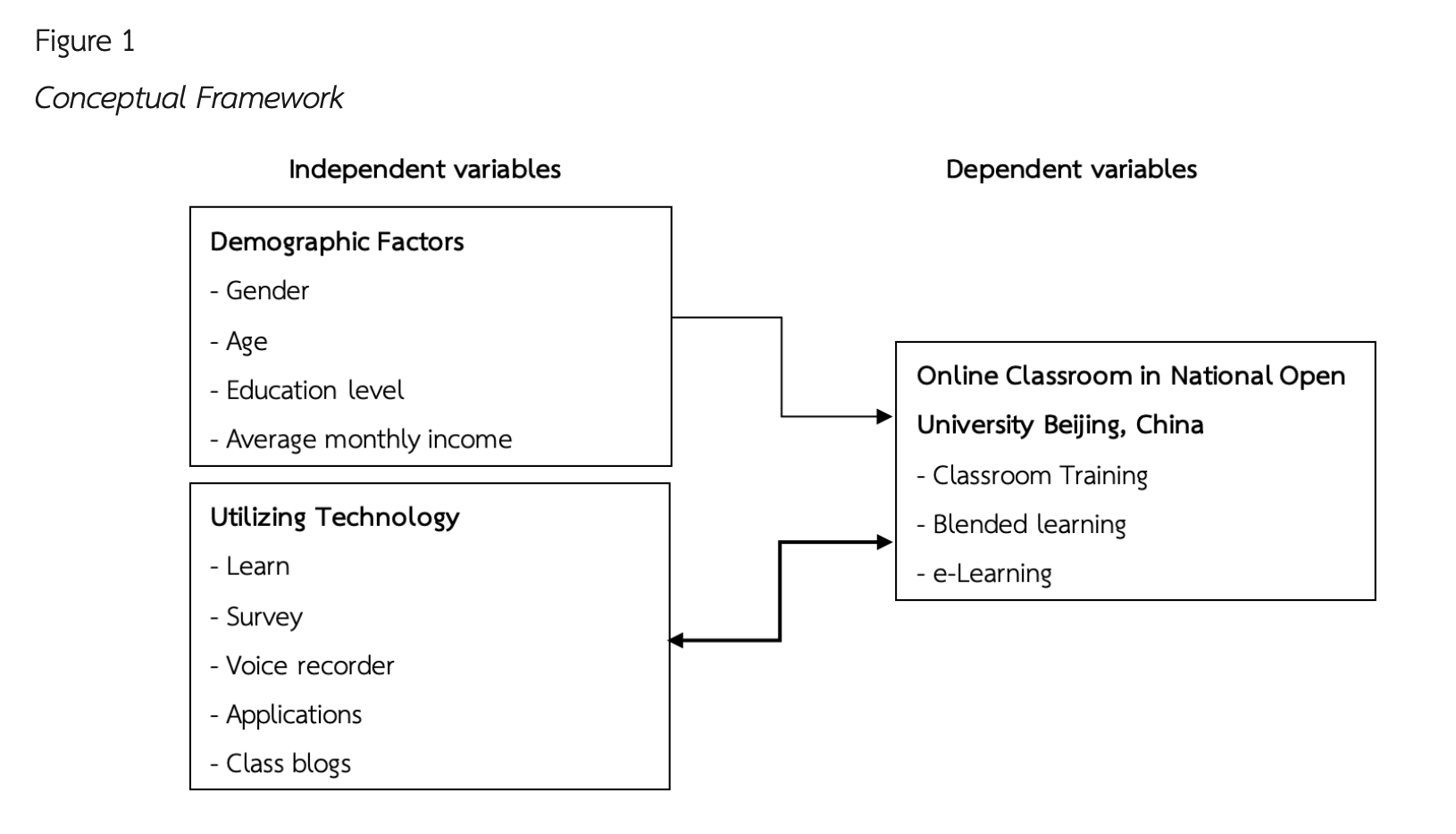THE EFFECT OF EDUCATIONAL LEADERSHIP ON IMPROVING THE CLASSROOM ENVIRONMENT IN NEW CONCEPT ENGLISH SCHOOL SHANDONG PROVINCE, CHINA
Main Article Content
บทคัดย่อ
The purpose of this research was to study the differences in demographic factors affecting the online classrooms at the National Open University Beijing, Beijing China and to study the relationship of utilizing technology with the online classrooms at the National Open University Beijing. All 385 professors from the National Open University Beijing were selected by the method of systematic random sampling using questionnaires as research tool for the data collection. Data were analyzed by the frequency, percentage, mean and standard deviation, testing through and testing the hypothesis with t-test, F-test and Pearson correlation. The results showed that: different demographic factors in terms of gender, age, education level and average monthly income had a statistically significant effect on the online classrooms at the National Open University Beijing at the high level and the utilizing of technology was positively correlated statistically significant with the online classrooms in all aspects.
Article Details
เอกสารอ้างอิง
Alam, A. (2022). Employing Adaptive Learning and Intelligent Tutoring Robots for Virtual Classrooms and Smart Campuses: Reforming Education in the Age of Artificial Intelligence. In Advanced Computing and Intelligent Technologies (pp. 395-406). Springer, Singapore.
Barr, R., Danziger, C., Hilliard, M. E., & Andrade, A. (2015). Associations between parenting style, physical discipline, and adjustment in adolescents' reports. Journal of Family Issues, 36(14), 1931-1956.
Baticulon, R. E., Sy, J. J. G., Alberto, N. R. I., Baron, M. B. M., Mabulay, R. E. C., Rizada, L. G. T., ... & Ranche, K. B. A. (2021). Barriers to online learning in the time of COVID-19: A national survey of medical students in the Philippines. MedRxiv. doi: 10.1101/2021.01.13.21249787
Berry, S. (2019). Teaching to connect: Community-building strategies for the virtual classroom. Online Learning, 23(1), 164-183.
Chen, J., & D'Mello, S. K. (2018). Nonlinear analysis of physiological data in affective computing: Challenges and potential solutions. IEEE Transactions on Affective Computing, 9(3), 335-347.
Curry, L. (2012). Learning style: State of the science. Theory into Practice, 51(1), 4-10.
Curry, L. (2019). Learning Styles and Learning Spaces: Enhancing Experiential Learning in Higher Education. Routledge.
Ellis, R. (2015). Understanding Second Language Acquisition. Oxford University Press.
Holmes, J. (2013). An Introduction to Sociolinguistics. Routledge.
Huang, R. H., Liu, D. J., Tlili, A., Yang, J. F., & Wang, H. H. (2020). Handbook on facilitating flexible learning during educational disruption: The Chinese experience in maintaining undisrupted learning in COVID-19 outbreak. Smart Learning Institute of Beijing Normal University
Huang, R., Liu, D., & Huang, G. (2019). Research on the Application of Big Data in Education. In 2019 International Conference on Big Data, Artificial Intelligence and Internet of Things Engineering (ICBAIE) (pp. 54-57). IEEE.
Jacob, R., & Issa, T. (2017). Evaluating small private online courses (SPOCs) using the community of inquiry framework. Distance Education, 38(1), 28-47.
Kolb, D. A. (2015). Experiential learning: Experience as the source of learning and development (2nd ed.). FT Press.
Lee, B., & Kim, H. (2014). What Can We Learn from Our Learners' Learning Styles?. English Language Teaching, 7(9), 118-131.
Ma, X., Fan, X., Li, W., Li, J., & Li, Q. (2021). The exploration and research of blended teaching mode based on “internet+” big data cloud platform. In Innovative Mobile and Internet Services in Ubiquitous Computing: Proceedings of the 14th International Conference on Innovative Mobile and Internet Services in Ubiquitous Computing (IMIS-2020) (pp. 334-343). Springer International Publishing.
Mayer, R. E. (2018). The Cambridge handbook of multimedia learning. Cambridge University Press.
McAdams, D. P. (2015). The Art and Science of Personality Development. Guilford Publications.
Mohd Shaharanee, I. N., Jamil, J., & Mohamad Rodzi, S. S. (2016). The application of Google Classroom as a tool for teaching and learning. Journal of Telecommunication, Electronic and Computer Engineering, 8(10), 5-8.
Puspitarini, Y. D., & Hanif, M. (2019). Using Learning Media to Increase Learning Motivation in Elementary School. Anatolian Journal of Education, 4(2), 53-60.
Richardson, M., Abraham, C., & Bond, R. (2012). Psychological correlates of university students’ academic performance: A systematic review and meta-analysis. Psychological Bulletin, 138(2), 353-387.
UNESCO. (2020). Education: From disruption to recovery. https://en.unesco.org/covid19/educationresponse
Zhang, C. (2016). Development and Prospect of China's Radio and TV Universities. Distance Education in China, 12(1), 5-9.


